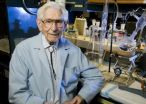(Press-News.org) The perennial stress-buster – a deep breath – could become stress-detector, claims a team of researchers from the UK.
According to a new pilot study, published today, 28 February, in IOP Publishing's Journal of Breath Research, there are six markers in the breath that could be candidates for use as indicators of stress.
The researchers hope that findings such as these could lead to a quick, simple and non-invasive test for measuring stress; however, the study, which involved just 22 subjects, would need to be scaled-up to include more people, over a wider range of ages and in more "normal" settings, before any concrete conclusions can be made, they state.
Lead-author of the study, Professor Paul Thomas, said: "If we can measure stress objectively in a non-invasive way, then it may benefit patients and vulnerable people in long-term care who find it difficult to disclose stress responses to their carers, such as those suffering from Alzheimer's."
The study, undertaken by researchers at Loughborough University and Imperial College London, involved 22 young adults (10 male and 12 female) who each took part in two sessions: in the first, they were asked to sit comfortably and listen to non-stressful music; in the second, they were asked to perform a common mental arithmetic test that has been designed to induce stress.
A breath test was taken before and after each session, whilst heart-rates and blood pressures were recorded throughout. The breath samples were examined using a technique known as gas chromatography-mass spectrometry, and then statistically analysed and compared to a library of compounds.
Two compounds in the breath – 2-methyl, pentadecane and indole – increased following the stress exercise which, if confirmed, the researchers believe could form the basis of a rapid test.
A further four compounds were shown to decrease with stress, which could be due to changes in breathing patterns.
"What is clear from this study is that we were not able to discount stress. It seems sensible and prudent to test this work with more people over a range of ages in more normal settings.
"We will need to think carefully about experimental design in order to explore this potential relationship further as there are ethical issues to consider when deliberately placing volunteers under stress. Any follow up study would need to be led by experts in stress," Professor Thomas continued.
Breath profiling has become an attractive diagnostic method for clinicians, and recently researchers have found biomarkers associated with tuberculosis, multiple cancers, pulmonary disease and asthma. It is still unclear how to best manage external factors, such as diet, environment and exercise, which can affect a person's breath sample.
"It is possible that stress markers in the breath could mask or confound other key compounds that are used to diagnose a certain disease or condition, so it is important that these are accounted for," said Professor Thomas.
The researcher's initial assumptions are that stressed people breathe faster and have increased pulse rates and an elevated blood-pressure, which is likely to change their breath profile. They emphasise, however, that it is too soon to postulate the biological origins and the roles of the compounds as part of a stress-sensitive response.
###From 28 February, this paper can be downloaded from http://iopscience.iop.org/1752-7163/7/1/017102
Notes to Editors
Contact
1. For further information, a full draft of the journal paper or contact with one of the researchers, contact IOP Press Officer, Michael Bishop:
Tel: +44 (0) 1179 301032
E-mail: michael.bishop@iop.org
The effect of paced auditory serial addition test (PASAT) intervention on the profile of volatile organic compounds in human breath: a pilot study
2. The published version of the paper "The effect of paced auditory serial addition test (PASAT) intervention on the profile of volatile organic compounds in human breath: a pilot study" J. Breath Res. 7 017102 will be freely available online from Thursday 28 February. It will be available at http://iopscience.iop.org/1752-7163/7/1/017102
Journal of Breath Research
3. This journal is dedicated to all aspects of breath science, with the major focus on analysis of exhaled breath in physiology and medicine, and the diagnosis and treatment of breath odours.
IOP Publishing
4. IOP Publishing provides publications through which leading-edge scientific research is distributed worldwide. IOP Publishing is central to the Institute of Physics (IOP), a not-for-profit society. Any financial surplus earned by IOP Publishing goes to support science through the activities of IOP.Beyond our traditional journals programme, we make high-value scientific information easily accessible through an ever-evolving portfolio of community websites, magazines, conference proceedings and a multitude of electronic services. Focused on making the most of new technologies, we're continually improving our electronic interfaces to make it easier for researchers to find exactly what they need, when they need it, in the format that suits them best. Go to http://ioppublishing.org/.
The Institute of Physics
5. The Institute of Physics is a leading scientific society. We are a charitable organisation with a worldwide membership of more than 45,000, working together to advance physics education, research and application. We engage with policymakers and the general public to develop awareness and understanding of the value of physics and, through IOP Publishing, we are world leaders in professional scientific communications.
Researchers look to breath to identify stress
2013-02-28
ELSE PRESS RELEASES FROM THIS DATE:
Modified protein could become first effective treatment for vitiligo
2013-02-28
MAYWOOD, Il. – Loyola University Chicago Stritch School of Medicine researchers have developed a genetically modified protein that dramatically reverses the skin disorder vitiligo in mice, and has similar effects on immune responses in human skin tissue samples.
The modified protein is potentially the first effective treatment for vitiligo, which causes unsightly white patches on the face, hands and other parts of the body. Loyola University Chicago has submitted a patent application for the protein, and researchers are seeking regulatory approval and funding for a ...
Spinal cancer: Guidelines for diagnosis unsupported in patients with lower back pain
2013-02-28
A new systematic review published in The Cochrane Library has raised doubts as to the effectiveness of "red flag" indicators at both identifying and excluding cancer in patients with lower back pain. The authors of the review concluded that most individual red flags were poor at diagnosing spinal malignancies and call for further studies focused on combinations of red flags.
Lower back pain is a common complaint, often with no obvious cause. In around 1-5% of patients with lower back pain, the condition results from a more serious underlying problem, such as a tumour. ...
Screening decisions are better informed when risk information is personalized
2013-02-28
Patients' ability to make genuinely informed choices about undergoing disease screening increases when the risk information that they receive is related to their own personal risk, rather than average risks, according to the results of a Cochrane systematic review. The authors reviewed data from studies, largely on cancer screens, in which patients were provided with personalised risk estimates.
The benefits of screening are not clear-cut. For example, screening can help detect cancer early, leading to successful treatment, but it can also lead to unnecessary treatment ...
Housing improvements should be targeted at those in poorest health
2013-02-28
Improving housing can improve health, particularly when interventions are targeted at those in the poorest health, according to a systematic review published in The Cochrane Library. The authors say their review underscores the importance of targeting those most in need when devising programmes for housing improvement.
Despite a wealth of research linking housing to health, it remains difficult to separate the effects of poor housing from the effects of other socioeconomic factors that influence health, such as poverty. The link could be made more strongly by showing ...
Patients with diabetes at no greater risk for infection
2013-02-28
Rosemont, Ill. – Patients with diabetes were no more likely to suffer infection, deep vein thrombosis (a deep vein blood clot) or other complications following total knee replacement (TKR) than patients without diabetes, according to new research published online today, in advance of its publication in the March 2013 Journal of Bone and Joint Surgery (JBJS).
The study authors sought to determine whether or not blood sugar level (glycemic control) influenced outcome in TKR. Fifty-two percent of people with diabetes have arthritis. Previous studies have found that poor ...
Scientists discover molecule that does double duty in stopping asthma attacks
2013-02-28
BOSTON, MA—Scientists from Brigham and Women's Hospital are on the brink of the next treatment advancement that may spell relief for the nearly nineteen million adults and seven million children in the United States suffering from asthma. The scientists discovered two new drug targets in the inflammatory response pathway responsible for asthma attacks.
The study will be published on February 27, 2013 in Science Translational Medicine.
Researchers studied the lungs and blood of 22 people with mild and severe asthma. They saw that immune cells called natural killer ...
New study shows viruses can have immune systems
2013-02-28
BOSTON (February 27, 2013, embargoed until 1 p.m. US ET) — A study published today in the journal Nature reports that a viral predator of the cholera bacteria has stolen the functional immune system of bacteria and is using it against its bacterial host. The study provides the first evidence that this type of virus, the bacteriophage ("phage" for short), can acquire a wholly functional and adaptive immune system.
The phage used the stolen immune system to disable – and thus overcome – the cholera bacteria's defense system against phages. Therefore, the phage can kill ...
Songbirds' brains coordinate singing with intricate timing
2013-02-28
As a bird sings, some neurons in its brain prepare to make the next sounds while others are synchronized with the current notes—a coordination of physical actions and brain activity that is needed to produce complex movements, new research at the University of Chicago shows.
In an article in the current issue of Nature, neuroscientist Daniel Margoliash and colleagues show, for the first time, how the brain is organized to govern skilled performance—a finding that may lead to new ways of understanding human speech production.
The new study shows that birds' physical ...
The NHL drafts the wrong players due to birthday bias
2013-02-28
ALLENDALE, Mich. — A hockey player's birthday strongly biases how professional teams assess his talent, according to a new study by Grand Valley State University researchers. The findings were published in the online journal PLOS ONE at http://dx.plos.org/10.1371/journal.pone.0057753.
The research, led by Robert Deaner, associate professor of psychology at Grand Valley State, shows that, on average, National Hockey League (NHL) draftees born between July and December are much more likely than those born in the first three months of the year to have successful careers. ...
Lipid researcher, 98, reports on the dietary causes of heart disease
2013-02-28
CHAMPAIGN, Ill. — A 98-year-old researcher argues that, contrary to decades of clinical assumptions and advice to patients, dietary cholesterol is good for your heart – unless that cholesterol is unnaturally oxidized (by frying foods in reused oil, eating lots of polyunsaturated fats, or smoking).
The researcher, Fred Kummerow, an emeritus professor of comparative biosciences at the University of Illinois, has spent more than six decades studying the dietary factors that contribute to heart disease. In a new paper in the American Journal of Cardiovascular Disease, he ...

